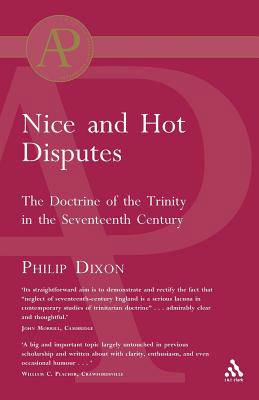
- Retrait gratuit dans votre magasin Club
- 7.000.000 titres dans notre catalogue
- Payer en toute sécurité
- Toujours un magasin près de chez vous
- Retrait gratuit dans votre magasin Club
- 7.000.0000 titres dans notre catalogue
- Payer en toute sécurité
- Toujours un magasin près de chez vous
203,95 €
+ 407 points
Description
At the beginning of the seventeenth century the doctrine of the Trinity was still a central theme in Christian Theology. By the end of the century it was fast becoming peripheral. As theologians today increasingly recognize the Trinity to be at the very heart of the Christian theology, the question of 'what went wrong' three hundred years ago is a matte of growing interest.
Whereas most studies of the history of tinritarian doctrine neglect the seventeenth century almost entirely, Philip Dixon argues that this is a key period in the history and development of the doctrine and, indeed, essential for contemporary understanding.
Drawing on a wide range of primary sources, Dixon examines the Socinian and anti-Socinian writings of the 1640s and 1650s, including Biddle and Cheynell, and their legacy for the disputes of the 1690s; the trinitarian theology of Hobbes and the violent reaction of his critics; the debates from the Restoration to the 1690s, including Milton, Nye, and Bury; the writings of Locke and Stillingfleet; and the continuation and development of these disputes into the early eighteenth century. A final chapter offers some significant conclusions for students of systematic and historical theology alike.
In the breadth of its scope and in the importance of the material uncovered, this book makes an unique contribution to the understanding of trinitarian theology and practice.
Whereas most studies of the history of tinritarian doctrine neglect the seventeenth century almost entirely, Philip Dixon argues that this is a key period in the history and development of the doctrine and, indeed, essential for contemporary understanding.
Drawing on a wide range of primary sources, Dixon examines the Socinian and anti-Socinian writings of the 1640s and 1650s, including Biddle and Cheynell, and their legacy for the disputes of the 1690s; the trinitarian theology of Hobbes and the violent reaction of his critics; the debates from the Restoration to the 1690s, including Milton, Nye, and Bury; the writings of Locke and Stillingfleet; and the continuation and development of these disputes into the early eighteenth century. A final chapter offers some significant conclusions for students of systematic and historical theology alike.
In the breadth of its scope and in the importance of the material uncovered, this book makes an unique contribution to the understanding of trinitarian theology and practice.
Spécifications
Parties prenantes
- Auteur(s) :
- Editeur:
Contenu
- Nombre de pages :
- 252
- Langue:
- Anglais
- Collection :
Caractéristiques
- EAN:
- 9780567042217
- Date de parution :
- 09-02-06
- Format:
- Livre broché
- Format numérique:
- Trade paperback (VS)
- Dimensions :
- 278 mm x 74 mm
- Poids :
- 312 g

Les avis
Nous publions uniquement les avis qui respectent les conditions requises. Consultez nos conditions pour les avis.






